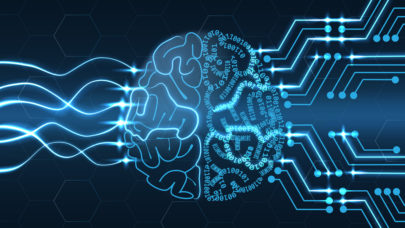
ANL Special Colloquium on The Future of Computing
May 19, 2022
There are, of course, a myriad of ideas regarding computing’s future. At yesterday’s Argonne National Laboratory’s Director’s Special Colloquium, The Future of Computing, guest speaker Sadasivan Shankar, did his best to convince the audience that the high-energy cost of the current computing paradigm – not (just) economic cost; we’re talking entropy here – is fundamentally undermining computing’s progress such that... Read more…

Exascale Watch: Aurora Installation Underway, Now Open for Reservations
May 10, 2022
Installation has begun on the Aurora supercomputer, Rick Stevens (associate director of Argonne National Laboratory) revealed today during the Intel Vision event keynote taking place in Dallas, Texas, and online. Joining Intel exec Raja Koduri on stage, Stevens confirmed that the Aurora build is underway – a major development for a system that is projected to deliver more... Read more…

Argonne AI for Science Colloquium Marks Challenges and Progress
November 9, 2021
It’s an understatement to say the effort to adapt AI technology for use in scientific computing has gained steam. Last spring, the Department of Energy released a formal report – AI for Science – suggesting an AI program not unlike the exascale program reaching fruition now. There’s also the broader U.S. National Artificial Intelligence Initiative pushing for AI use throughout society. Last week, as part of a year-long celebration of its 75th founding anniversary, Argonne National Laboratory held... Read more…

At SC20, an Expert Panel Braces for the Next Pandemic
November 17, 2020
COVID-19 isn’t over – not even close. With about six months until broad vaccine distribution is expected, the world will likely face a long, difficult winte Read more…

AI is the Next Exascale – Rick Stevens on What that Means and Why It’s Important
August 13, 2019
Twelve years ago the Department of Energy (DOE) was just beginning to explore what an exascale computing program might look like and what it might accomplish. Today, DOE is repeating that process for AI, once again starting with science community town halls to gather input and stimulate conversation. The town hall program... Read more…

AI for Science Town Hall Series Kicks off at Argonne
August 2, 2019
Argonne National Lab, future home to the Intel-Cray Aurora supercomputer, recently hosted the first in a series of four AI for Science town hall meetings being convened by Department of Energy laboratories. The meetings are aimed at soliciting and collecting "community input on the opportunities and challenges facing the scientific community in the era of convergence of high-performance computing and artificial intelligence (AI) technologies." Read more…

ML Experts Confront Reproducibility Claims
March 13, 2019
Machine learning researchers are pushing back on the recent assertion that the AI framework is a key contributor to a reproducibility crisis in scientific research. Rick Stevens, associate laboratory director for computing, environment and life sciences at Argonne National Laboratory... Read more…

DOE Research Group Makes Case for Exascale
February 21, 2011
Exascale computing promises incredible science breakthroughs, but it won't come easily, and it won't come free. Read more…

- Click Here for More Headlines

Whitepaper
Transforming Industrial and Automotive Manufacturing
In this era, expansion in digital infrastructure capacity is inevitable. Parallel to this, climate change consciousness is also rising, making sustainability a mandatory part of the organization’s functioning. As computing workloads such as AI and HPC continue to surge, so does the energy consumption, posing environmental woes. IT departments within organizations have a crucial role in combating this challenge. They can significantly drive sustainable practices by influencing newer technologies and process adoption that aid in mitigating the effects of climate change.
While buying more sustainable IT solutions is an option, partnering with IT solutions providers, such and Lenovo and Intel, who are committed to sustainability and aiding customers in executing sustainability strategies is likely to be more impactful.
Learn how Lenovo and Intel, through their partnership, are strongly positioned to address this need with their innovations driving energy efficiency and environmental stewardship.
Download Now
Sponsored by Lenovo
Whitepaper
How Direct Liquid Cooling Improves Data Center Energy Efficiency
Data centers are experiencing increasing power consumption, space constraints and cooling demands due to the unprecedented computing power required by today’s chips and servers. HVAC cooling systems consume approximately 40% of a data center’s electricity. These systems traditionally use air conditioning, air handling and fans to cool the data center facility and IT equipment, ultimately resulting in high energy consumption and high carbon emissions. Data centers are moving to direct liquid cooled (DLC) systems to improve cooling efficiency thus lowering their PUE, operating expenses (OPEX) and carbon footprint.
This paper describes how CoolIT Systems (CoolIT) meets the need for improved energy efficiency in data centers and includes case studies that show how CoolIT’s DLC solutions improve energy efficiency, increase rack density, lower OPEX, and enable sustainability programs. CoolIT is the global market and innovation leader in scalable DLC solutions for the world’s most demanding computing environments. CoolIT’s end-to-end solutions meet the rising demand in cooling and the rising demand for energy efficiency.
Download Now
Sponsored by CoolIT
Advanced Scale Career Development & Workforce Enhancement Center
Featured Advanced Scale Jobs:
HPCwire Resource Library
HPCwire Product Showcase
© 2024 HPCwire. All Rights Reserved. A Tabor Communications Publication
HPCwire is a registered trademark of Tabor Communications, Inc. Use of this site is governed by our Terms of Use and Privacy Policy.
Reproduction in whole or in part in any form or medium without express written permission of Tabor Communications, Inc. is prohibited.
























